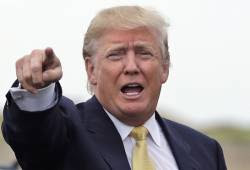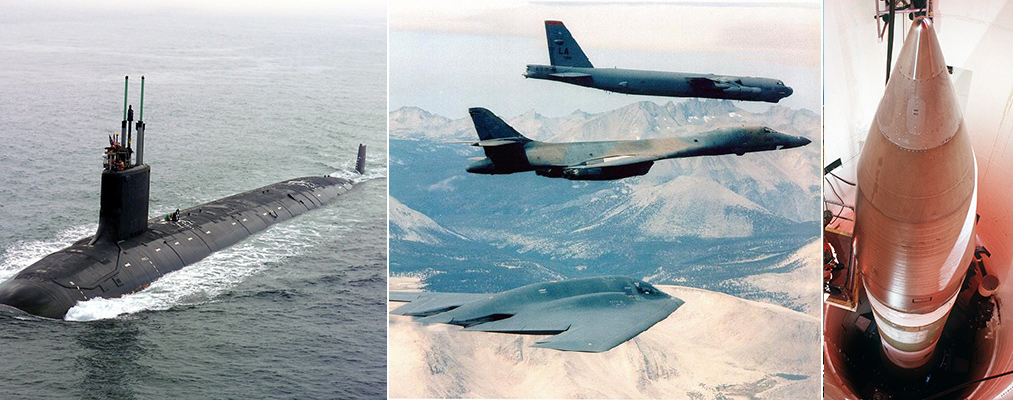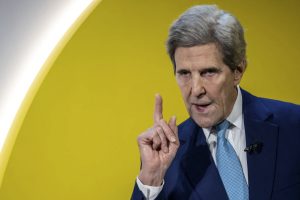Yearly Archives: 2017
DONALD TRUMP IS THE CHOICE PRESIDENT OF THE UNITED STATES FOR AFRICA,Prophesy!!

Dear Mr. Trump, we Africans are excited about your presidency and want to see you become the future leader of that great nation because you embody quality of solutions for Africa. There is nothing we have not seen or heard from the Clinton’s family and presidency, their legacy has left scars from the misery they supported in our countries which we have been forced to accept as a way of life. To us Clinton represent endless conflicts, exploitation of the weak, reign terror, violence and hopeless continent.
We want to see change in our time; we are ready to open our continent for this change to take place. We have followed your campaigns, listened to your speeches and have come to believe that you make a great president for this generation. America should remember its mission of leading by example than mislead infant states! You have our backing; just let us know what you need from Africans to boost your campaign. I know you do not need money from us for we are poor and marginalized, but we do have a good noise that could silence your opponents at a crucial time, we have the records of wrongs for those who are poised to challenge you for this post, if these records can be dished out for public consumption, shame will eliminate your opponents even if they are still surviving on the pain killers to spread their contagious flu.

Dear Americans citizens, we have enjoyed 8 long years of ambiance under Obama administration, it is now time to go back to serious obligations of your country which you were entrusted by your founding fathers, ‘America is to become the guardian of modern democracy and a new hope for the hopeless societies, specifically the smaller states’. This is the interpretation of President Truman’s vision which was later cemented by your bravest leader J.F. Kennedy.
In the Atlantic Charter, from which we derive the idea of the United Nations, your president Franklin D. Roosevelt, listed Allied goals for reasons which America could be drawn to war against another state as the desire to removing threats to the liberty of man and defence for self governance of weaker states. During the hailstorm of World War II, Roosevelt made sure that his friends the British Prime Minister Churchill and the Russian president Joseph Stalin, were not motivated by interest of subjugating the weaker societies or expansionism to go to war before persuaded him into an alliance against Hitler’s Nazi Germany. If America still breeds visionary leaders with a clear global vision in which all men are included in their telescope of equal beings, then you got to vote for Mr. Trump as your president and best representative to the World. We have seen his quality that will preserve the American true values and our continent too foresees that his reign will become a positive omen for us to view the future in its full dimension.
I wish also to remind my readers that the majority of Africans, fall in the category of those classified as minorities in USA; therefore we call for American minorities to vote for Mr. Trump into the White House so that our World here can restart a new light year of hope.
Dear Africans and black men, Trump said ‘blacks are lazy and only good at sex is not a blasphemy and should cause no resentment in a positive mind; a friendly whip would point a finger at your spot and this could only be done by someone who cares enough than mockers. Those who are at the receiving end from brutal regimes like my compatriots in Rwanda understand this truth and should cause them to desire to back Mr. Trump for meaningful hope and progress for this continent
Support Trump, the Republican presidential candidate by writing letters of support like this one to all Americans.
Richard
NPC
Donald Trump Boosts Europe’s Anti-Establishment Movement “What America can do we can do as well.”

- “America has just liberated itself from political correctness. The American people expressed their desire to remain a free and democratic people. Now it is time for Europe. We can and will do the same!” — Geert Wilders, Dutch MP, head of the Party for Freedom (PVV), and now on trial in the Netherlands for free speech.
-
- “2016 is, by the looks of it, going to be the year of two great political revolutions. I thought Brexit was big but boy this looks like it is going to be even bigger.” — Nigel Farage, MEP and leader of the UK Independence Party.
- “The political class is reviled across much of the West, the polling industry is bankrupt and the press just hasn’t woken up to what’s going on in the world.” — Nigel Farage.
- “In a democracy, when the people feel ignored and despised, they will find a way to be heard. This vote is the consequence of a revolt of the middle class against a ruling elite that wants to impose what they should think.” — Laurent Wauquiez, leader of the French opposition party The Republicans.
Donald Trump’s electoral victory has come as a shock to Europe’s political and media establishment, which fears that the political sea change underway in the United States will energize populist parties in Europe.
Anti-establishment politicians, many of whom are polling well in a number of upcoming European elections, are hoping Trump’s rise will inspire European voters to turn out to vote for them in record numbers.
Commenting on Trump’s victory, Dutch lawmaker Geert Wilders, wrote: “America has just liberated itself from political correctness. The American people expressed their desire to remain a free and democratic people. Now it is time for Europe. We can and will do the same!”
More than a dozen elections will be held in Europe during the next twelve months, beginning with a re-run of the Austrian presidential election scheduled for December 4. Polls show that Norbert Hofer, of the anti-immigration Austrian Freedom Party, is on track to win that race.
Also on December 4, Italians will vote in a referendum on reforming the constitution. Observers say Trump’s victory will make it more difficult for Italian Prime Minister Matteo Renzi, one the few world leaders publicly to endorse Hillary Clinton, to prevail. They say Renzi’s open support for Clinton will hurt Italy’s relations with the United States. Renzi has said he will resign if he loses the referendum, which calls for curbing the role of the Senate. Most opinion polls show the “no” camp ahead. Renzi says the move will simplify decision-making, but opponents say it will reduce checks and balances.
General elections are scheduled in 2017 for the Czech Republic, France, Germany and the Netherlands, EU countries where anti-establishment candidates are challenging the established order.
Mainstream politicians and the media have sought to discredit populist leaders by branding them as neo-Nazi and xenophobic for their opposition to mass migration, multiculturalism and the rise of Islam in Europe. If Donald Trump can demonstrate that he is able to govern the United States and produce tangible results, especially by growing the economy and curbing illegal immigration, Europe’s political establishment will have a much harder time stigmatizing dissenters.

Anti-establishment politicians in Europe, such as Party for Freedom leader Geert Wilders (left) in the Netherlands and UK Independence Party leader Nigel Farage (right), have embraced Donald Trump and hope his rise will inspire European voters to turn out to vote for them in record numbers. |
What follows is a selection of official European reactions to Trump’s election victory. Anti-establishment politicians have embraced Trump, while establishment politicians have mostly issued pro forma congratulatory statements that are polite but formal and distant.
Austria. The leader of the Freedom Party, Heinz-Christian Strache, congratulated Trump on Facebook. He wrote:
“Little by little, the political left and the out-of-touch and corrupt establishment is being punished by voters and driven from power. This is a good thing, because the law comes from the people. The Austrian mainstream media, which has been campaigning against Trump for weeks and prematurely declared Hillary Clinton the victor, were embarrassed by the voting public.”
Belgium. The populist Vlaams Belang (Flemish Interest) party congratulated Trump and said his unexpected election victory could be repeated in Europe. Party chairman Tom Van Grieken tweeted: “U.S. election shows again how far politicians are from the people.” In another tweet, he wrote: “The rise of Trump is not an isolated phenomenon. In Europe too, more and more voters want real change.”
Britain. Prime Minister Theresa May said:
“I would like to congratulate Donald Trump on being elected the next President of the United States, following a hard-fought campaign. Britain and the United States have an enduring and special relationship based on the values of freedom, democracy and enterprise. We are, and will remain, strong and close partners on trade, security and defense.”
The leader of the UK Independence Party, Nigel Farage, who successfully campaigned for the “Brexit” referendum for Britain to leave the European Union, said Trump’s victory did not surprise him. He tweeted:
“2016 is, by the looks of it, going to be the year of two great political revolutions. I thought Brexit was big but boy this looks like it is going to be even bigger.”
He also tweeted: “I hand over the mantle to @RealDonaldTrump! Many congratulations. You have fought a brave campaign.”
Speaking to ITV, Farage said: “The political class is reviled across much of the West, the polling industry is bankrupt and the press just hasn’t woken up to what’s going on in the world.”
Czech Republic. President Milos Zeman said Trump’s election was a victory over “media manipulation.” He said:
“I would like to cordially congratulate Donald Trump. I had, as one of few European politicians, declared public support for this candidate because I agree with his opinions on migration as well as the fight against Islamic terrorism. I appreciate Donald Trump’s public demeanor. He speaks clearly, sometimes roughly, but understandably, and avoids what is sometimes called political correctness.”
European Union. European Council President Donald Tusk wrote:
“Europe and the United States simply have no option but to cooperate as closely as possible. I listened with attention to President-elect Trump’s call for American unity. And I, in turn, would like to call for European and transatlantic unity. I do not believe that any country today can be great in isolation. But I do believe that America and Europe can, should and will work together. It is in our common interest. We have to recognise that this will take major efforts from both sides. The EU is a strong and reliable partner and will remain so. We expect the same from America and its new President.”
France. President François Hollande tweeted: “The American people have expressed themselves. They elected Donald Trump. I congratulate him. I am also thinking of Hillary Clinton.”
The French Ambassador to the US, Gérard Araud, tweeted: “This is the end of an epoch. After Brexit and this vote anything is possible. The world is crumbling in front of our eyes.” He later deleted the tweet.
Former Prime Minister Dominique de Villepin said: “What’s happening in the US could happen in France.”
Former Prime Minister Jean-Pierre Raffarin said: “The boundaries of reason disappeared with Brexit, the main lesson for France is that Le Pen can win.”
Laurent Wauquiez, leader of the opposition party The Republicans, said: “In a democracy, when the people feel ignored and despised, they will find a way to be heard. This vote is the consequence of a revolt of the middle class against a ruling elite that wants to impose what they should think.”
The leader of the National Front party, Marine Le Pen, tweeted: “Congratulations to the new president of the United States Donald Trump and the free American people!”
Le Pen’s father, party founder Jean-Marie Le Pen, tweeted: “Today the United States, tomorrow France.”
Germany. Chancellor Angela Merkel, who did not mention Trump by name, lectured the president-elect on values:
“Germany and America are connected by values of democracy, freedom and respect for the law and the dignity of man, independent of origin, skin color, religion, gender, sexual orientation or political views. I offer the next president of the United States close cooperation on the basis of these values.”
Vice Chancellor Sigmar Gabriel was less gracious. He said:
“Trump is the harbinger of a new authoritarian and chauvinist international movement. He is also a warning for us. Our country and Europe must change if we want to counter the authoritarian international movement.”
Foreign Minister Foreign Frank-Walter Steinmeier said:
“We hope that we are not facing greater instability in international politics. During his campaign, Trump was critical not just of Europe, but also of Germany. I believe we must prepare for American foreign policy becoming less predictable. We must prepare for a situation in which America will be tempted to make decisions on its own more often.
“I do not want to sugarcoat it: Nothing will be easier and much will be more difficult. Just as we Germans learned a lot in the past from our American friends, we should now encourage our American friends to stay true to past partnerships and to us.”
Defense Minister Ursula von der Leyen said Trump’s victory was “a big shock” and “not a vote for him but rather against Washington, against the establishment.” She added:
“Of course we Europeans, as a NATO ally, know that if Donald Trump becomes president, he’ll ask: What are you contributing to this alliance? But we’re also wondering, what’s your position on this alliance?”
Justice Minister Heiko Maas tweeted: “The world won’t end. But it will get crazier.”
The leader of the populist Alternative für Deutschland (AfD) party, Frauke Petry, predicted that Trump’s victory would result in a political change in Europe too. On Facebook, she wrote:
“It was high time that in the United States of America, people who feel disaffected withdrew their vote for the political establishment. While 93% of voters in Washington, DC voted for Clinton in order to retain their own power structures, the majority of voters across the country want a political new beginning, an economic recovery for the stricken middle class and an end of division in what is still the most powerful country in the world.
“This election result is encouraging for Germany and for Europe, because Trump really has the cards for political sea-change in his hand. I congratulate Donald Trump on his election victory and on this historic chance….
“Like Americans, citizens of Germany must have the courage to put a tick in the ballot box and not remain complacent. Their opinion counts, even if political correctness would appear to have elevated the decreed consensus to the level of a new doctrine.”
Beatrix von Storch, an AfD Member of the European Parliament, wrote:
“Donald Trump’s victory is a clear signal that citizens of the Western world want political change. This is a surprise only to the establishment. In the USA as well as Germany, citizens wish for secure borders, less globalism, and politics that focus with common sense on issues in their own country.”
Hungary. Prime Minister Viktor Orbán wrote on Facebook: “What great news. Democracy is still alive.”
Italy. The founder of the anti-establishment 5-Star Movement, Beppe Grillo, hailed Trump’s victory. He wrote:
“This is proof that these millions of demagogues are not the people, they are journalists, intellectuals, anchored to a world that no longer exists. There are similarities between these events in America and our movement…. We are going to govern and they will ask: ‘But how did they do it?’ They channelled the collective anger.”
The Netherlands. Dutch lawmaker Geert Wilders said:
“America regained its national sovereignty, its identity, it reclaimed its own democracy, that’s why I call it a revolution.
“Now there is a leader, despite all the negativity spread about him by the political elite and the press, that has only one concern, and that is the national interest of the voters of America who are concerned about immigration, who are concerned about the job loss as a result of globalization, who are concerned about the Islamization of their society. And he tends to say the truth and convince people that if they start moving, anything is possible, and I believe the historical event of yesterday will have an enormous effect on European politics as well.
“The lesson for Europe is, what America can do we can do as well.”
In an essay published by Breitbart, Wilders wrote:
“Yesterday, the American people made it quite clear that they do not want to follow in Western Europe’s footsteps. They do not want to give their country away. They want to preserve their nation, their freedoms, their prosperity. They felt the time for liberation had come.
“The American voters no longer want to be represented by politicians who do not take their concerns seriously. They felt Donald Trump was the only one who listens to them….
“America has just liberated itself from political correctness. The American people expressed their desire to remain a free and democratic people. Now it is time for Europe. We can and will do the same!”
Donald Trump and the Return of European Anti-Americanism by Soeren Kern

- European criticism of Trump goes far beyond a simple displeasure with the man who will be the next president. The condemnation reveals a deep-seated contempt for the United States, and for American voters who democratically elected a candidate committed to restoring American economic and military strength.
-
- The primary cause of the global disorder is the lack of American leadership at home and abroad. A series of feckless decisions by Obama to reduce American military influence abroad have created geopolitical power vacuums that are being filled by countries and ideologies that are innately hostile to Western interests and values.
- For the past seven decades, the U.S. has spent hundreds of millions of dollars annually to guarantee German security, although Germany steadfastly refuses to honor a NATO pledge to spend 2% of GDP on defense spending. Germans are now offended that Trump is asking them to pay their fair share for their own defense.
- Although President Obama’s foreign policy missteps have made Europe much less safe than it was eight years ago, European elites have overlooked Obama’s mistakes because he is a “globalist” who seems to favor recreating the U.S. in the European image. Trump, by contrast, is a nationalist who wants to rebuild the U.S. in the American, not the European, image.
- European anti-Americanism is certain to escalate in the years ahead, not because of Trump or his policies, but because “globalists” appear desperate to save the failing European Union, an untransparent, unaccountable, anti-democratic, sovereignty-grabbing alternative to the nation state.
European anti-Americanism — which was on the wane during the presidency of Barack Obama, who steered the United States on a course of globalism rather than nationalism — is back with a vengeance.
Europe’s media establishment has greeted Donald Trump’s election victory with a vitriol not seen since the George W. Bush presidency, when anti-Americanism in Europe was at fever pitch.
Since the American election on November 9, European television, radio and print media have produced an avalanche of negative stories, editorials and commentary that seethe with rage over the outcome of the vote.
European criticism of Trump goes far beyond a simple displeasure with the man who will be the next president. The condemnation reveals a deep-seated contempt for the United States, and for American voters who democratically elected a candidate committed to restoring American economic and military strength.
If the past is any indication of the future, European anti-Americanism will be a pervasive feature of transatlantic relations during the Trump presidency.
Although European opinion-shapers have focused much of their indignation on the threat Trump allegedly poses to global order, the president-elect will inherit a world that is significantly more chaotic and insecure than it was when Obama became president in January 2009.
The primary cause of the global disorder is the lack of American leadership — leading from behind — at home and abroad.
A series of feckless decisions by Obama to reduce American military influence abroad have created geopolitical power vacuums that are being filled by countries and ideologies that are innately hostile to Western interests and values. China, Russia, Iran, North Korea and radical Islam — among many others — have all been emboldened to challenge the United States and its allies with impunity.
European elites have been mostly silent about Obama’s foreign policy failures, but are now lashing out at Trump for pledging to restore order by “making America great again.”
As during the Bush administration, anti-Americanism in Europe is once again being driven by Germany, a country that was effectively rebuilt by the United States after the Second World War. The Marshall Plan granted West Germany some $1.5 billion ($15 billion in 2016 dollars) in reconstruction aid between 1948 and 1951.
For the past seven decades, the United States has spent hundreds of millions of dollars annually to guarantee German security, although Germany steadfastly refuses to honor a NATO pledge to spend a minimum of 2% of GDP on defense spending. Germany spent only 1.16% of GDP on its own defense in 2015 and 1.15% in 2016. German officials are now offended that Trump is asking them to pay their fair share for their own defense.
Following is a small sampling of recent European commentary on Donald Trump and the United States:
In Germany, the Hamburg-based newsmagazine Der Spiegel, one of the largest-circulation publications in Europe, published a cover with an image of a giant meteor in the shape of Trump’s head hurtling towards the earth. The headline reads: “The End of the World (As We Know It). The issue includes more than 50 pages of related content, including an article by Dirk Kurbjuweit entitled, “One-Hundred Years of Fear: America Has Abdicated Its Leadership of the West.” He wrote:
“For 100 years, the United States was the leader of the free world. With the election of Donald Trump, America has now abdicated that role. It is time for Europe, and Angela Merkel, to step into the void….
“Trump, who wants nothing to do with globalization; Trump, who preaches American nationalism, isolation, partial withdrawal from world trade and zero responsibility for a global problem like climate change….
“We now face emptiness — fear of the void. What will happen to the West, to Europe, to Germany without the United States as its leading power?

In Germany, Der Spiegel, one of the largest-circulation publications in Europe, published a cover, after Donald Trump’s election victory, with an image of a giant meteor in the shape of Trump’s head hurtling towards the earth. The headline reads: “The End of the World (As We Know It)”. |
In an article, “Trump’s Victory Ushers in Dangerous Instability,” Spiegel commentator Roland Nelles wrote:
“It really happened. He did it. Donald Trump proved all experts wrong…. A man who… preaches hate and snubs America’s most important partners will run the most powerful country on Earth. It is a political catastrophe.
“Crude populism has triumphed over reason. Trump’s success is a shock for all those who had counted on the political wisdom of American voters….
“The world, and America, is now threatened by a dangerous phase of instability: Donald Trump wants to make America ‘great’ again. If one believes his pronouncements, he will proceed ruthlessly: He wants to throw 11 million migrants out of the country, renegotiate all major trade agreements and make important allies such as Germany pay for US military protection. That will trigger significant conflict, incite new rivalries and spur new crises.”
In an opinion article, “An Absurd and Dangerous President,” Spiegel commentator Klaus Brinkbäumer wrote:
“The United States has voted for a dangerously inexperienced and racist man — one who was swept into the White House by an army of disenfranchised white working- and middle-class Americans. It is a movement that now threatens democracy around the world….
“In other words, 60 million Americans acted stupidly. They cast their votes for xenophobia, racism and nationalism, the end of equal rights and social conscience, for the end of climate treaties and health insurance. Sixty million people followed a demagogue who will do little for them.
“Those who have lived in New York or experienced dinner conversations in Georgetown and debates at Harvard University’s Kennedy School of Government, know how brilliantly intelligent and worldly Americans can be…. Once you get outside such circles, such cosmopolitan thinking isn’t nearly as widespread.”
The Munich-based Süddeutsche Zeitung, in an article, “Trump’s Foreign Policy: What This Election Means for the World,” stated:
“The man who politicians around the world called ‘scary,’ ‘ignorant’ or ‘irrational’ will move into the White House. The uncertainty around the world is great. If cartoonists are to be believed, Donald Trump’s idea of the world is very simplistic. Africa is the birthplace of Barack Obama. Russia is a country that was made great again. Great Britain is a no-go area.”
The Hamburg-based Die Zeit, in an article, “Trump and How He Sees the World,” wrote:
“Wow. The West crumbles before our eyes. What is going on here can be explained by two data points: On November 9, 1989, the wall fell in Berlin…. On November 9, 2016, exactly 27 years later, a man has been elected to the White House whose central election pledge was the construction of a wall.
“The ideas of the new president are neither contradictory nor confused. His demands can be easily summarized on the cap of a beer bottle: integrate Putin, keep Mexicans out and treat American allies as the customers of a security service. There is only protection if one pays cash, even in NATO.
In a commentary, “The End of the Enlightenment,” Zeit essayist Adrian Daub wrote:
“Donald Trump is a remnant of a dying America…. He has turned the country from a multicultural lighthouse into an isolated island of white people who are afraid of their own shadow.
“The idea of American exceptionalism, the lighthouse, was already present at the foundation of the nation…. The idea of American radiance is one with the ideas of the Enlightenment that came from Europe to the colonies. Ideas like universal values or the human striving for truth.
“Trump’s election means the end of this project. The United States is no longer a lighthouse, but a flaming fire of tired shadows armed to the teeth. No trace remains of its prototypical character, its imitability. It is defiant, closed to the world. The nationalism of isolationism… the tumultuous tribalism… are shaking the foundations of the Enlightenment.
“The US upheld the values of the Enlightenment — humanism, an optimistic image of man, human dignity and civil rights — when Europe deviated from them in the thirties. It used humanism as a weapon in the struggle against fascism, its universality as a counterpart to nationalism, and with its re-importation after the Second World War has contributed to the reestablishment of the European project. Today, these values are once more in trouble in Europe, but the view across the Atlantic will not be reassuring as of January.”
Other German headlines include: “Trump has the Charisma of a Drunken Elephant,” “Donald Trump: A Horror Clown as a Security Risk,” “Trump: How Could this Happen?,” “Plans of the New US President: How Trump Wants to Poison the Air,” “Donald Trump: A Blow to Open Society,” “America Chooses the Great Divider,” “Donald Trump: A King Without a Plan,” “Donald is not Ronald,” “Donald is not Churchill,” “Can Trump also Happen in Germany?,” “How to Prevent a German Trump,” “Who Can Stop Trump Now?,” and “Will Berlin Have to Pay More for Defense?“
In Britain, the Guardian published an editorial, “The Guardian View on Trump’s Foreign Policy: A Threat to Peace,” which stated:
“The victory of Donald Trump shatters the notion that the US can be counted on by its allies not just for defense guarantees and economic cooperation, but even as a defender of liberal democracy, rather than a threat to it. It calls into question the traditional US role as a protector of a UN-based global architecture of multilateralism….
“For Donald Trump, politics — like business — is about deal making. He thinks man-to-man talk with dictators can instantly dissolve problems, and approaches foreign affairs as zero sum game in which making America great can mean demeaning its traditional friends. His election makes the world a more dangerous place and also a more uncertain place, for it is too early to say precisely how those dangers will materialize — or how the next US president will face up to them.”
The Guardian, in an essay, “A Win for Trump was a Win for Bigotry,” columnist Owen Jones wrote:
“Hang on a minute: who am I as a Briton to interfere in the internal affairs of a foreign country? The problem is the entire world is now subject to the writ of the leader of the last superpower. We are all, to a degree, under his dominion….
“Trumpism is, by nature, an authoritarian movement that regards democratic norms as dispensable if they fail to serve political ends. The aspiration — whether realizable or not — is clear: authoritarian societies such as Putin’s Russia, Erdoğan’s Turkey and Orbán’s Hungary that maintain certain democratic trappings as a convenient front.
“If the American people simply accept the legitimacy of this president, and they normalize this would-be tyrant, it will only embolden him…. Civil disobedience should be employed where necessary. Don’t just do it for yourself, America. The fate of the rest of the world will be determined by your choices.”
Other British headlines include: “Will Donald Trump Destroy America?,” “Why President Donald Trump is an Even Bigger Disaster than You Thought,” “Donald Trump’s Victory is a Disaster for Liberal Values,” “Donald Trump’s Victory is a Disaster for Modern Masculinity,” “Privacy Experts Fear Donald Trump Running Global Surveillance Network,” “Terrifying Trump Will Turn into Tamed Trump? It’s an Illusion,” “The Magnetic Pull of Trump, King Narcissist,” “Will Donald Trump Make School Lunches Unhealthy? Doctors Warn the President-elect’s Penchant for Burgers and Fried Chicken Could Hit Meal Trays,” “In the Age of Trump, Why Bother Teaching Students to Argue Logically?,” and “Donald Trump Believed to be Direct Descendant of Rurik the Viking who Established Russian State.”
In Spain, where anti-Americanism has held sway for many decades, the newspaper El País published an essay, “Declaration of War against Stupidity,” which showcases the contempt many Europeans have for ordinary Americans. The newspaper’s long-time essayist, John Carlin, wrote:
“The victory of Trump represents a rebellion against reason and decency. It is the triumph of racism, or misogyny, or stupidity — or all three things at once. It is the expression of the poor judgment and bad taste of 60 million Americans, the vast majority of them men and women of white skin who own homes, cars, firearms and eat more than citizens of any other country on earth.
“This is where you see with perfect clarity the stupidity, frivolity and irresponsibility of those who voted for Trump. For all of Clinton’s defects, they are trivial compared to those of Trump, whose ignorance, zero principles and zero experience in governance are joined by all forms of personal vices that every person in their right mind at any latitude of the world considers deplorable.
“I know the kind who voted for Trump. I met them when I made reports in Texas, Montana, Arizona, Oklahoma, Alabama and other typically Republican states. They tend to be kind, religious and honest people, decent in their reduced social orbit. But after sitting down to talk with them for a while I always reacted with the same perplexity: how is it possible that we speak the same language? Their words are familiar to me but their brain circuits operate differently. They are people of simple faith, oblivious to the irony; people who choose their truths not based on facts but on their beliefs or prejudices; people who live far from the ocean and the rest of planet Earth, of which they are afraid. I’ve never experienced a similar sense of disconnection in Europe, Africa or Latin America. Just inside the United States.”
In Austria, Kronen Zeitung published a headline entitled, “Nuclear Suitcase: In 72 Days Trump Could Annihilate Civilization.” Also in Austria, Kurier published a story entitled, “Trump Victory: Boon for Suicide Hotlines.” In France, the newspaper Libération featured a cover with Trump and the words “American Psycho.” Another headline read: “United States: The Empire of the Worst.” L’Obs asked, “With Trump, the Beginning of De-Globalization?” Le Figaro wrote: “Donald Trump: From Clown to President,” and “Europe Paralyzed by the Trump Shock.” Le Monde wrote, “Donald Trump’s Victory: A Brexit for America.” In the Netherlands, Telegraaf declared, “Trump is a Nightmare for Europe.”
How is one to interpret the resurgence of anti-American sentiment in Europe?
Although President Obama’s foreign policy missteps, especially those in the Middle East, have made Europe much less safe than it was eight years ago, European elites have overlooked Obama’s mistakes because he is a “globalist” who seems to favor recreating the United States in the European image. Trump, by contrast, is a nationalist who wants to rebuild the United States in the American, not the European, image.
European anti-Americanism is certain to escalate in the years ahead, not because of Trump or his policies, but because “globalists” appear desperate to save the failing European Union, an untransparent, unaccountable, anti-democratic, sovereignty-grabbing alternative to the nation state.
Europeans have time and again overestimated their ability to make a fragmented Europe act like a single unified actor. As it turns out, anti-Americanism is a powerful ideology that has wide appeal across Europe — not just among the elites.
In the past, European federalists have tried to make anti-Americanism the basis of a new pan-European identity. This artificial post-modern European “citizenship,” which demands allegiance to a faceless bureaucratic superstate based in Brussels, has been presented as a globalist alternative to the nationalism of the United States. In essence, to be “European” means to not be American.
As the European Union comes apart at the seams, Europe’s political establishment can be expected to try to exploit anti-Americanism in a desperate attempt to use it as a glue to hold a fractured Europe together.
Whether or not that succeed depends, ironically, on U.S. President-elect Donald Trump. If he can demonstrate that he is able to govern the United States and produce tangible results, especially by growing the economy and curbing illegal immigration, Trump is certain to energize support for anti-establishment politicians in Europe, many of whom are already polling well in a number of upcoming general elections.
Commenting on Trump’s victory, Dutch Parliamentarian Geert Wilders, wrote: “America has just liberated itself from political correctness. The American people expressed their desire to remain a free and democratic people. Now it is time for Europe. We can and will do the same!”
Does Your Family Vehicle Look Like a Tank Too?
What does your family vehicle look like? For some Jerusalem families, it looks more like a tank that belongs on the Gaza border. And still, firebombs penetrated the steel mesh and double reinforced bullet-proof glazing.
Imagine taking a trip to the grocery store in a battle tank…
This is the sad reality for Jewish families who live in certain neighborhoods of Jerusalem – the capital of Israel!
Why should Jews have to live under constant fear of the next terror attack? Jews should be able to live safely anywhere they choose in their eternal capital.
Come and see how dangerous it can be. You will not believe what you see…

Sign the Declaration to Keep Jerusalem United
Jerusalem Must Remain the United Capital of Israel
I declare that Jerusalem is the eternal capital of the Jewish People and support all efforts to maintain and strengthen a united Jerusalem as the undivided capital of the State of Israel.
Does the U.S. Need the Minuteman?

It seems that the U.S., without a Minuteman missile force, would make it easy — in fact tempting — for an adversary such as Russia to take out the entire U.S. strategic nuclear force in one or a series of very limited first strikes.
- Under Secretary Perry’s proposal, the U.S. “target set” of nuclear submarines and bombers would consist of five military bases: three for bombers and two for submarines, and a handful of submarines at sea. From over 500 targets today, to fewer than 10. It would be as if the U.S. declared to its enemies, “Come and get us.”
- The elimination of the Minuteman missile force, recommended by Dr. Perry, would leave Russia with an alarming ratio — nearly 200:1 — of Russian warheads to American nuclear assets. This disparity could push the strategic nuclear balance toward heightened instabilities.
- Another way to look at it is that the Minuteman would cost only 1/3 of 1% of the total current budget of the Department of Defense.
Former Secretary of Defense William Perry calls for the nuclear land based force of 450 Minuteman missiles to be eliminated. He says that the United States does not need the missiles for nuclear deterrence. He also says that, because of Russia’s current reckless and cavalier attitude about the early use of Russian nuclear weapons, he worries that in a crisis, an American President might launch Minuteman missiles out of fear that Russia might preemptively launch a first strike against America’s “vulnerable” missile silos.
Although the former Secretary of Defense is to be admired for his previous work on stealth technology, now part of the backbone of America’s strategic nuclear bomber force[1], his recommendation on land-based missiles is, in fact, dangerous, wrong-headed and will lead to the very destabilizing relations with Russia he is hoping to avert.
There are five key reasons why his proposal makes little sense.
First, the U.S. is not in an arms race with Russia — a competition Dr. Perry fears would be fueled by going forward with the Minuteman. America’s strategic (long-range) forces happen to be limited — as are those of Russia — by the 2010 New Start Treaty between the two superpowers. Strategic nuclear warheads are capped at 1550. If anything, Russia is rapidly modernizing, ostensibly within those limits, while the United States is trying — slowly — to catch up.
Although special bomber-counting rules in the treaty allow both nuclear powers to field more bomber weapons than are officially counted in the treaty ceilings (a bomber with 8-12 bombs counts only as “one” bomb or warhead), both the “fast flyer” American missiles of the land-based Minuteman nuclear force and the Ohio class submarines are strictly capped — including any new modernized force — through 2025.[2]
The last time the U.S. modernized the Minuteman force was between 1993-2008. Then, under the START I and Moscow treaties, deployed U.S. nuclear weapons were reduced from roughly 12,000 to 2,200.[3] During that entire period, Minuteman modernization served a stabilizing role, and was fully compatible with arms control — as remains true today.
Second, the Minuteman missile force is not in any way in danger of being launched or used recklessly or inadvertently.[4]
The nuclear force the U.S. now maintains consists of:
- 450 silo-based land-based missiles and their associated launch control centers;
- 60 nuclear-capable bombers at three bases;
- 4 deployed nuclear submarines each at two additional bases, of which 4-6 are at sea at any one time.
These make America’s early use of nuclear weapons in a crisis unnecessary. Why? The U.S. nuclear force, including a robust ICBM fleet, cannot as a whole be eliminated in a first strike by an adversary without prompting a massive U.S. retaliatory strike in return. As noted, there are more than 500 ICBM-related American nuclear targets spread over five extremely large Western states, plus submarines in the vast expanse of the Pacific and Atlantic oceans. In a first strike, all of these forces would have to be eliminated simultaneously by an adversary to prevent the U.S. from being able to launch a devastating response.
As U.S. assets are different distances from Russian missile launch points, the flight times of Russian missiles to U.S. missile silos, and submarine and bomber bases, would be different. Russian missiles therefore could not be launched simultaneously from Russia without arriving on U.S. soil at different times.
Thus, under current conditions, an adversary could not attack all U.S. assets simultaneously.
If an adversary were to set their computers for launches to compensate for the differences missile flight times, the U.S. would be warned by its satellites, which would detect the first missile launch. The U.S. could then go on full alert, and send bombers into the air and submarines out to sea.
Even to try such an attack, an adversary such as Russia would, ironically, have to give ample warning. To carry out such a surprise attack, involving so many warheads, Russia, just as an example, would have to generate (visibly deploy) its nuclear forces, and move its land-based missiles from garrison positions into the field, or move its submarines out to sea. These force movements would easily be seen by U.S. reconnaissance satellites, which exist precisely to provide the United States with a warning. There would therefore be time to generate U.S. nuclear forces and make them even more survivable than they would be on a normal, peaceful day-to-day basis. The adversary’s element of surprise then would be eliminated.
It is true that during the height of the Cold War, there was indeed a fear that during a political crisis the U.S. might feel a need to “go first,” (“prompt launch”) its nuclear missiles. At that time, the Soviets fielded an enormous arsenal of nearly 12,000 strategic nuclear warheads, most on fast-flying nuclear-tipped missiles. Due to the relative vulnerability of U.S. nuclear forces, it was feared that, in a crisis, the Soviet leaders might be tempted to use their nuclear weapons first. Their aim would be to destroy as much of the U.S. nuclear forces “on the ground” before they could be launched in retaliation. Such fears might, in turn, prompt the U.S. into “beating them to the punch.”[5]
There was also then the concern that, in a crisis, as the Soviet Union would have plenty of warheads left over after a first strike — still far in excess of what the U.S. had left in reserve — the U.S. could be coerced to stand down and surrender even before a shot was fired.
Today, however, given the comparatively low level of strategic nuclear weapons now fielded by both Washington and Moscow — 90% below the Cold War levels — and their improved relative survivability, such fears no longer apply. Russia would have to use nearly its entire nuclear arsenal just to try to take out America’s hundreds of Minuteman missile silos and launch control centers. But even if successful — an extremely dubious proposition — Russia still would have to worry about America’s submarines at sea, as well as its bombers, launching a devastating response.
In short, even if one leg of the U.S. nuclear Triad were eliminated, the other two would remain able to fight back. Taking out all three simultaneously is an unfeasible a task; taking out only one leg makes no sense.
America’s robust Triad of forces — land, sea and air — gives the U.S. a stability that makes the successful first use of nuclear forces by either side a virtual impossibility; no rational objective could be achieved.

The U.S. nuclear “Triad” consists of nuclear warheads mounted on platforms based at sea, in the air and on land. |
The third point is that if the current Minuteman force were eliminated through obsolescence or attrition, ironically the very international instabilities feared by Dr. Perry — such as Russian leader using nuclear weapons in a crisis — would emerge in a dramatic fashion.
Certainly, Russian President Vladimir Putin’s statements about Russia’s nuclear doctrine are indeed cause for concern, especially his oft-repeated remarks that he would use nuclear weapons early in a crisis and against non-nuclear armed states.
But if that is true, it seems that the United States, without a Minuteman force, would make it easy — in fact tempting — for an adversary such as Russia to take out the entire U.S. strategic nuclear force in one or a series of very limited, even surreptitious, first strikes? Under Secretary Perry’s proposal, the U.S. “target set” of nuclear submarines and bombers would consist of five military bases: three for bombers and two for submarines, and a handful of submarines at sea. That is it. From over 500 targets today, to fewer than 10 in the future. It would be as if the United States painted a bulls-eye on its nuclear forces and told our enemies, “Come and get us.”
As the former U.S. Chief of Naval Operations warned, a serious concern within the US Navy is that technological advances may render the oceans ‘transparent’ in the future, and U.S. submarines at sea would no longer be invulnerable to attack. If the seas were no longer opaque, Russia could over time surreptitiously eliminate American submarines deployed at sea. Then, in a crisis, Russia might seek to hold remaining U.S. assets at risk, either in port or on base, and try to coerce the U.S. to stand down and surrender.
Again, why would the United States make it easier for its enemies to accomplish such an objective? America’s intercontinental ballistic missiles (ICBMs), the Minuteman force, are an insurance policy against such a potential eventuality.
Fourth, what about strategic stability? Compared to the current situation, in which Russian nuclear forces now have three nuclear weapons for each of America’s nuclear assets of bombers, submarines and land-based missiles, the elimination of the Minuteman force, as Dr. Perry recommends, would leave Russia with an alarming ratio — nearly 200:1 — of Russian warheads to American nuclear assets. This disparity could push the strategic nuclear balance toward heightened instabilities — exactly the opposite of what nearly five decades of strategic arms control between the United States and Russia have sought to prevent. With such a huge advantage, would not Russia be tempted in a crisis to try and eliminate our relatively small nuclear deterrent?[6]
Finally, fifth, the cost of maintaining the Minuteman force is minimal compared to the overall cost of running the U.S. government, the U.S. military and the U.S. nuclear enterprise. Each year, the Minuteman missiles cost around $1.6 billion, including all soldiers, operations and maintenance, research, development and acquisition. Projected Minuteman costs for nuclear modernization in the future are $2.2 billion for 3-5 years, then gradually returning to roughly their current level of expenditures.[7]
Thus at its peak, Minuteman would cost about 20% of what Amer
icans now pay to go to movies theaters each year. Another way to look at it is that the Minuteman would cost only 7% of the peak future nuclear Triad modernization costs per year. This comes to 1/3 of 1% of the total current budget of the Department of Defense, or an astoundingly small $1 out of every $2,500 dollars the Federal government will spend in 2025 — the same year the Minuteman modernization effort would be ramped up.
In short, from the perspective of maintaining deterrence, strategic stability, the ability to be effective during a crisis, and using defense dollars wisely, the Minuteman force is an extraordinary asset, a required modernization, and critical to the security of our country and allies.
























